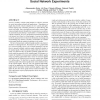Free Online Productivity Tools
i2Speak
i2Symbol
i2OCR
iTex2Img
iWeb2Print
iWeb2Shot
i2Type
iPdf2Split
iPdf2Merge
i2Bopomofo
i2Arabic
i2Style
i2Image
i2PDF
iLatex2Rtf
Sci2ools
113
click to vote
WWW
2010
ACM
2010
ACM
Measurement-calibrated graph models for social network experiments
Access to realistic, complex graph datasets is critical to research on social networking systems and applications. Simulations on graph data provide critical evaluation of new systems and applications ranging from community detection to spam filtering and social web search. Due to the high time and resource costs of gathering real graph datasets through direct measurements, researchers are anonymizing and sharing a small number of valuable datasets with the community. However, performing experiments using shared real datasets faces three key disadvantages: concerns that graphs can be de-anonymized to reveal private information, increasing costs of distributing large datasets, and that a small number of available social graphs limits the statistical confidence in the results. The use of measurement-calibrated graph models is an attractive alternative to sharing datasets. Researchers can “fit” a graph model to a real social graph, extract a set of model parameters, and use them t...
Related Content
| Added | 13 May 2010 |
| Updated | 13 May 2010 |
| Type | Conference |
| Year | 2010 |
| Where | WWW |
| Authors | Alessandra Sala, Lili Cao, Christo Wilson, Robert Zablit, Haitao Zheng, Ben Y. Zhao |
Comments (0)

